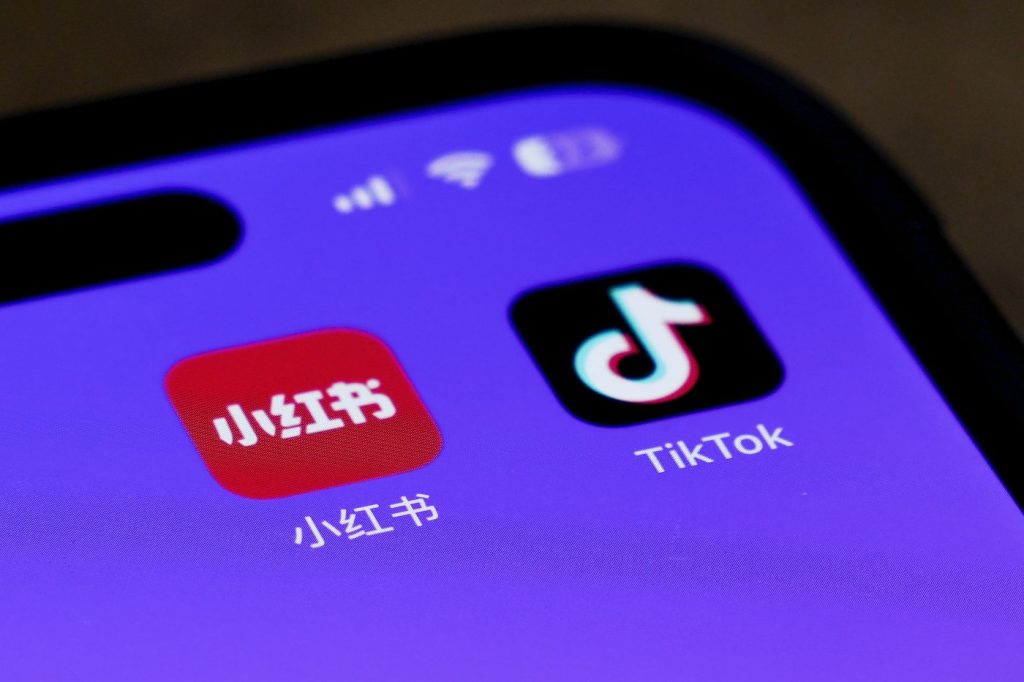As the threat of a potential TikTok ban looms in the United States, many American users are turning to the Chinese social media platform Xiaohongshu, also known as "Little Red Book." This app has become the top downloaded free app on Apple's App Store in the U.S., surpassing TikTok, as users seek alternatives amidst growing national security concerns regarding the popular video-sharing app.
The U.S. Supreme Court is set to rule on a law that mandates TikTok must divest from its Chinese parent company, ByteDance, by January 19 or face a potential ban. After the justices indicated support for the law, numerous TikTok users began creating accounts on Xiaohongshu in a collective response, often referring to themselves as "TikTok refugees." Many of them are utilizing hashtags like #tiktokrefugee in their posts to express their sentiments.
Xiaohongshu is a multifaceted platform combining e-commerce, short videos, and social media functions. With approximately 300 million monthly active users, mainly young women, it serves as a popular resource for product recommendations, travel tips, and beauty tutorials in China and among Chinese communities in Malaysia and Taiwan.
The hashtag #tiktokrefugee has accumulated over 160,000 posts, predominantly featuring American users introducing themselves and asking for guidance on how to navigate the app, which they endearingly nickname "RedNote." Users from the U.S. are engaging with the platform, with some expressing their discontent regarding the potential TikTok ban and its broader implications on jobs, friendships, and online communities.
21-year-old Alexis Garman from Oklahoma is among those who have migrated to Xiaohongshu. With nearly 20,000 followers on TikTok, she joined the new platform after seeing others do the same. Despite having privacy concerns regarding data, she described her experiences on Xiaohongshu as welcoming. Many users, including Garman, emphasize the loss of community and connections that a TikTok ban would incur.
Some users are vocal about their motivations for joining Xiaohongshu, openly protesting the potential ban of TikTok. An American user known as Definitelynotchippy addressed Chinese users, explaining that their government claims TikTok is owned by Chinese entities, attempting to stir negative perceptions. She remarked that many of them are subverting this narrative by downloading an ostensibly "actual Chinese app" as a form of protest, aiming to foster understanding and camaraderie across cultures.
Welcoming reactions from Chinese users on Xiaohongshu are evident, with many ready to share resources on learning Chinese and navigating the internet landscape in China. They have been cautioned to avoid discussing politically sensitive topics, as censorship is prevalent on the app, similar to other internet platforms in China.
Nevertheless, despite this growing influx of users from the U.S., it remains unclear whether Xiaohongshu will effectively replace TikTok. The latter has developed a dynamic ecosystem that supports e-commerce and advertising, contributing significantly to its popularity. Xiaohongshu largely caters to a Chinese user base and currently lacks translation features, posing challenges for international users.
Interactions between American and Chinese users reflect a desire for cultural exchange despite ongoing geopolitical tensions. There have been positive exchanges ranging from collaborative comments on posts to live chats. The platform has enabled users like Amanda, another TikTok refugee, to celebrate their positive experiences with Xiaohongshu, highlighting a sentiment of unity with a Chinese user who remarked, "We are not enemies; we are human beings living in one world!"
As TikTok faces an uncertain future in the U.S., the surge in American users onto Xiaohongshu signifies a complex interplay of social media, culture, and politics, paving the way for new connections and interactions between diverse cultures on a global platform.










